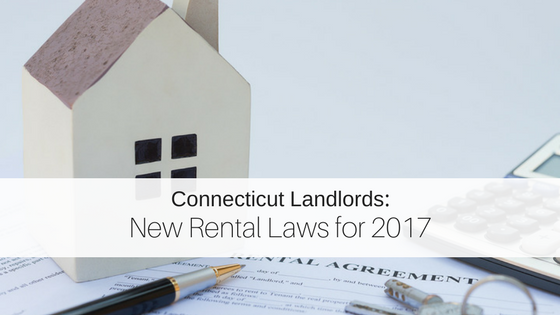
Connecticut has recently introduced new legislation regarding rental housing law in an attempt to regulate landlord behavior and protect renters, according to JD Supra.
Rental laws involving security deposits, foreclosed leasehold interests, substitute housing, and the disposition of deceased tenant’s belongs have been signed by the governor and will become law October 1, 2017.
New Connecticut Laws About Security Deposits
According to Public Act 17-236 from Substitute House Bill No. 7-19, the following laws will take effect October 1, 2017:
If a tenant is under sixty-two years of age, a landlord may only collect a security deposit equal to or less than two months’ rent.
If a tenant is sixty-two years or older, a landlord may only collect a security deposit equal to or less than one month’s rent.
Additionally, if a tenant becomes sixty-two years old and has previously paid a security deposit that exceeds an amount equal to one month’s rent to their current landlord, the landlord must return the portion of the security deposit that exceeds one month’s rent at the tenant’s request.
More information about current Connecticut security deposit laws can be found here: Connecticut General Statutes- Sec. 47a-21. Security Deposits.
New Connecticut Laws About Foreclosed Rental Properties
According to Public Act 17-26 from Substitute House Bill No. 7015, the following laws will take effect October 1, 2017:
If a landlord continues to collect rental payments after a final judgement of foreclosure has been entered, the mortgagor shall be subject to the penalties for larceny under sections 53a- 122 to 53a-125b, inclusive, of the general statutes depending on the amount involved.
New Connecticut Laws About Managing Deceased Tenants’ Possessions
According to Public Act No. 17-22 of Senate House Bill No. 932, the following laws regarding a deceased tenants possessions will take effect October 1, 2017:
If the sole tenant of a rental property and the landlord has complied with any lease requirements related to lease termination upon the death of the occupant the landlord may reach out to an emergency contact or next of kin to handle the deceased tenant’s belongs.
The provisions of Public Act No. 17-22 state that the following process must be met:
Send notice to the emergency contact designated by the occupant, if any, and to the next of kin of such occupant, if known, by both regular mail, postage prepaid, and by certified mail, return receipt requested, stating that
- The occupant has died
- The landlord intends to remove any possessions and personal effects remaining in the premises and to rerent the premises
- If the next of kin or emergency contact does not reclaim the possessions, they should immediately contact the landlord or Probate Court for the district in which the dwelling unit is located for information on how to reclaim such possessions and personal effects, and
- If such possessions and personal effects are not reclaimed within sixty days after the date of such notice, such possessions and personal effects will be disposed of as permitted by this section.
The notice shall be in clear and simple language and shall include a telephone number and a mailing address at which the landlord can be contacted and the phone number of such Probate Court.
If there is no known emergency contact or next of kin, the landlord shall file an affidavit with the Probate Court. The affidavit shall include the name and address of the deceased occupant, the date of death, the terms of the lease, and the names and addresses of the emergency contact, if any, and the next of kin, if known.
These new laws regarding a deceased tenant’s possessions make it easier and less expensive for a landlord to manage a deceased tenant’s possessions if an emergency contact is identified in a lease agreement.
This article is for informational purposed only, and does not constitute as legal advice. Please consult an attorney in your state for legal advice. This information is seen as current and up-to-date as of July 31, 2017. Due to the nature of changing rental laws, updates and amendments to current state laws may change but may not be reflected in this article.
About Connecticut Landlord-Tenant Laws
Laws about rental properties which affect landlords and tenants can be found in the Official State Statutes of Connecticut, including in the following chapters and sections:
- Conn. Gen. Stat. §§ 830 – Rights and Responsibilities of Landlord and Tenant
- Conn. Gen. Stat. §§ 831 – Advanced Rental Payment. Security Deposits
- Conn. Gen. Stat. §§ 832 – Evictions
- Conn. Gen. Stat. §§ 833 – Entry and Detainer
- Conn. Gen. Stat. §§ 833a – Health and Safety Standards […] in Rented Dwellings
- Conn. Gen. Stat. §§ 834 – Court Proceedings on Housing Matters






We have been thur this situation and the laws are fairly pacific in Oregon. We gave the family time to do services ect- then contacted them to arrange a vacancy process- we went out of our way to send the deceased items back to out of town family members. Then we negociated with the family to settle the issues without going the paperwork route with the government. Don’t delay- the process can become very involved.
How can I find out if I have eviction, I vacated the premises on the 1st of the month , I didn’t receive my security back , they charged me for removing one couch
You can check your eviction history through sites like this: https://www.myrentalhistoryreport.com/.
Did you have any unpaid rent or fees that you owed the landlord? They can use your security deposit to cover these past due expenses. Did you provide your landlord with your new address to send security deposit information?
I read that only an owner/landlord can collect rents without a real estate broker/sales license – if someone else collects the rent and they aren’t an employee of the landlord living on the rental property, they must have the license described above. Is this true?